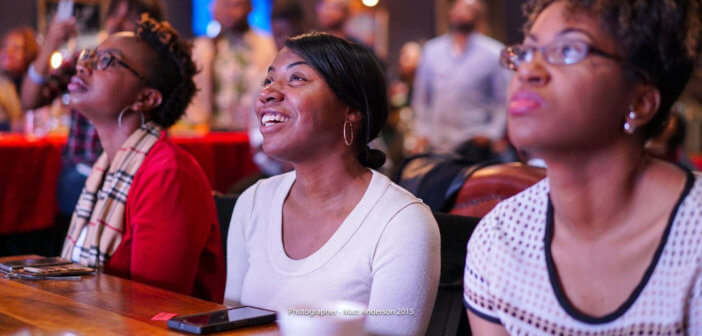Ebonie Johnson Cooper describes how involving young adults in an innovative process of ministry design can enhance their church participation. She outlines five pilot initiatives that are proving fruitful at Reid Temple AME Church in Maryland.
Contrary to popular belief, young adult Christians are not a monolithic group. We do not think alike. We do not worship God alike. And we do not see the church in the same way. Evidence of these statements is found in research conducted by several churches taking part in the Wesley Innovation Hub, an initiative funded by the Lilly Endowment that brings together diverse congregations to learn and practice ministry innovations that engage young adults using a design thinking methodology.
At Reid Temple AME, where I am a member, we employed focus groups, asset mapping, and in-depth interviews to discover issues that our young adults wanted to address. The team then created a number of prototype initiatives that are being tested over the next 12-15 months. While these initiatives are unique to the needs of the Reid Temple young adults, they can also be tested at other churches seeking to engage at a deeper level with their young adults.
1. Creating safe spaces
We have learned that young adults want to feel safe at church. They want to be able to be transparent with leadership while also sensing a reciprocal feeling of authenticity from leadership. To test the concept of safe spaces, we are implementing life groups, which are small group gatherings of 8-10 young adults, meeting over the course of 6-8 weeks, led by fellow young adults. Not to be confused with Bible study groups, life groups use faith-based books, podcasts or thematic devotionals to guide organic conversations week to week. These intimate gatherings create safe spaces for young adults to begin to trust one another and the ministry that has been developed for them.
2. Fostering community
Reid Temple has approximately 6,000 young adult members, across three campuses. As you might imagine, fostering a sense of community can be challenging. Instead of segmenting or limiting our young adults to programs at one campus or another, we will host programs that appeal to all young adults on neutral ground. One is a dialogue series on “adulting” as a young Christian. Many millennials use the popular term “adulting” to describe the hardships and nuances of traversing through the “real world.” Through our research, we found that Christian young adults are uniquely positioned to help one another navigate issues such as dating, marriage, finances and even parenting. Therefore, we plan to host a dialogue series to encourage conversation, support, and community among our young adults.
3. Growing disciples through missional outreach
We recognize that as Christians we are called to be disciples and go beyond the walls of the church to minister. Our young adults have expressed their desire to be more involved with missional outreach. We plan to test a few community service projects that will demonstrate our love for Christ by helping others. These mission-driven projects will take form through partnerships and service with local nonprofits, as well as international organizations.
4. Revamping young adult ministries
One of the most encouraging research findings we uncovered was the desire to remodel our young adult ministries at all campuses. The stereotype that millennials resist change has been largely debunked in the work of all the Wesley Innovation Hub churches. In fact, the young adults involved want change and are embracing innovative programs and ministries. Reid Temple will test the careful reconstruction of the young adult ministry leadership at Reid North and help to revamp the ministry at the Glenn Dale campus.
5. Young adult leadership development
One area rarely celebrated about young adults is their desire to lead effectively. We found this to be true during our research, as many of our participants want to be active in leadership roles within ministries. Consequently, we decided to test the success of a leadership development series using existing young adult leaders as well as those who seek to be in leadership. By providing leadership development training, we hope to empower our young adults to fill more leadership roles and equip them to serve effectively.
The five areas we are testing at Reid Temple are just the beginning. The Wesley Innovation Hub has opened a door for us to walk with our young adults as never before in ways that uniquely meet their desires. I have learned not to put God in a box or limit God’s ability to be who God is. Similarly, we should not place limits on how we reach young adults, who are the future of the church, based on traditions and stereotypes. The onus is on us, today, to think outside the box and engage the next generation of Christian leaders in ways that encourage them to be the church and not just attend the church.
- Leading Ideas Talks podcast episode: “Effectively Engaging Millennials” featuring Joshua Mitchell
- What Kind of Church Will Millennials Lead? by David McAllister-Wilson
- 5 Steps for Putting Good Ideas into Action by Jim Hoffman






